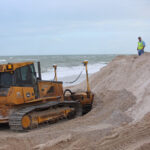INDIAN RIVER COUNTY – Tracking Station Beach in Indian River Shores will be kept open and guarded after county commissioners voted to stretch the county’s lifeguard staff to cover the beach.
To make the accommodations, the county will relocate lifeguards and supervisors from Golden Sands and Treasure Shores beaches to Tracking Station Monday through Friday. The decision to reverse the previous county government decision came less than a week after a front-page story in our sister publication, Vero Beach 32963, reported the anger of the Town of Indian River Shores over the decision to remove lifeguards from the town’s only public beach — one of the few services the county provides for town residents in return for the millions they pay the county in real estate taxes.
A part-time lifeguard will cover the beach on the weekends at a cost of $14,000, which was not included in the 2009-2010 budget approved by commissioners. The funds will come out of the recreation budget, but it is not clear whether other programs will need to be cut to fund the $14,000 lifeguard position or if the money will come out of contingency funds.
The county had anticipated a $110,000 savings by closing the lifeguard stand at Tracking Station Beach, which is least used by residents and visitors. If they would have added the whole $110,000 back into the budget, that would have provided double-coverage at the beaches, the same level of service residents enjoyed during the 2008-2009 budget year.
County Commissioner Joe Flescher put the discussion on the commission agenda for Tuesday morning, seeking a way to keep the beach open and guarded.
“I did a Google search on the cost of a human life and I couldn’t find it. If a beach is less attended, does that mean the value of those lives are worth less or that the value of the life is less important?” he said.
Commissioner Peter O’Bryan made the motion to adopt the staff proposal, which was called Option C, to shift the lifeguards at Golden Sands and Treasure Shores to cover Tracking Station during the week, adding the part-time help on the weekend to ensure double-coverage at all guarded beaches during the most used times.
“I think if we moved some personnel around and shifted the hours, we could make this work,” O’Bryan said. “In a $302 million budget, we should be able to do this.”
Budget Director Jason Brown, who recommended commissioners choose a budget-neutral option, cautioned that the plan might necessitate overtime to cover all the beaches without a full staff if too many vacation and sick days overlap.
“There already is pressure on the overtime budget,” Brown said.
Flescher said he was “satisfied” that the Tracking Station would still be guarded, but that the lack of funds for adequate staffing and supervision of the beaches from Golden Sands to Round Island would stretch the ocean rescue personnel very thin.
“At the end of the year, I believe that the analysis will reveal that the $42,000 option might have been the equivalent of what will happen,” Flescher said.
O’Bryan’s motion passed 4-1, with Commissioner Gary Wheeler casting the lone no vote.
Wheeler told his fellow commissioners that he preferred keeping Tracking Station Beach unguarded in order to save money.
“I have a serious problem with dipping into contingency this early in the year,” Wheeler said. “At some point, we need to start thinking like common citizens.”
Wheeler said people should make responsibile choices and if they want to swim and don’t feel safe without having a lifeguard on duty, they should plan their trips to the beach accordingly and visit places that are guarded. He pointed out that only a tiny percentage of Florida’s coastline is guarded.
County Administrator Joe Baird said the budget cuts, which originally designated the Tracking Station Beach for going unguarded, are the precursor of even more tough decisions to come.
“This is just the beginning, I don’t think we’ll be able to afford two lifeguards on the beaches going forward,” he said.






